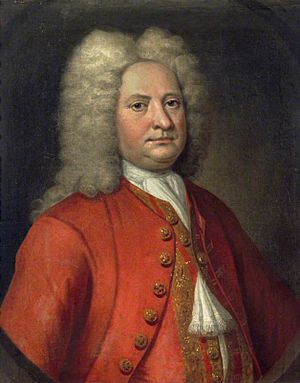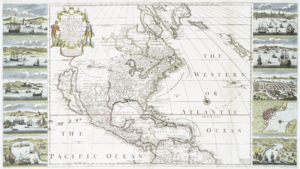Edward Wolfe facts for kids
Quick facts for kids
Edward Wolfe
|
|
|---|---|

Oil on canvas portrait of Edward Wolfe by Sir James Thornhill, c.1730
|
|
| Born | 1685 York, England |
| Died | 26 March 1759 (aged 73–74) Blackheath, England |
| Allegiance | |
| Service/ |
|
| Years of service | 1700–1759 |
| Rank | Lieutenant-general |
| Commands held | 1st Marine Regiment 8th (The King's) Regiment of Foot |
| Children | James Wolfe |
Edward Wolfe (born 1685, died 1759) was a British army officer. He fought in several important wars. These included the War of the Spanish Succession and the War of Jenkins' Ear. He also helped stop the 1715 Jacobite rebellion. Edward Wolfe is most famous for being the father of James Wolfe. James Wolfe was a hero for capturing Quebec in 1759.
Contents
Edward Wolfe's Early Life and Career
Edward Wolfe was born in 1685 in York, England. His family had moved to England from Ireland. They were originally Catholic but later became Protestant.
Edward started his army career in 1700 as a lieutenant. He quickly moved up the ranks. By 1705, he was a captain. He became a brigade major during a big military campaign in Flanders. This was under the famous Duke of Marlborough. In 1715, he helped General Wade in the Scottish Highlands. They were putting down a rebellion by clans who supported the Jacobites.
After the Treaty of Utrecht, Europe had a long period of peace. This meant fewer chances for active military service. In 1726, Edward married Henrietta Thompson. She was the sister of a Member of Parliament, Edward Thompson. Their son, James Wolfe, was born in 1727. Because Edward was a soldier, James grew up around military life. The family lived in Westerham in Kent, at a house now called Quebec House. In 1738, they moved to Greenwich to be closer to London.
The Cartagena Expedition
In 1739, war with Spain seemed likely. Edward Wolfe got ready to return to active duty. The start of the War of Jenkins' Ear caused the British military to grow. Several new marine regiments were created. Wolfe was promoted to Colonel. He was given command of one of these new regiments.
A large expedition was planned to sail to the Caribbean. It was led by Lord Cathcart. The goal was to follow up on a British victory at Porto Bello. In 1740, Wolfe and his regiment traveled to Portsmouth. Then they went to the Isle of Wight. This is where the expedition was gathering. Edward brought his son, James, along as a volunteer. James hoped to gain valuable experience as a soldier. However, he became very ill and had to go home to Greenwich. James felt embarrassed, but it probably saved his life.
Edward Wolfe and his regiment took part in the expedition. It turned into a disaster. The British decided to capture the port of Cartagena in South America. This port was used to ship precious metals. But the British attacked during the rainy season. Around 18,000 soldiers died, almost all from disease. They gave up on Cartagena. Then they tried to capture Santiago in Cuba, but failed there too. The expedition then returned home.
Later Military Career
Wolfe was lucky to survive the Cartagena disaster. So many of his fellow soldiers had died. In 1745, he became Colonel of the 8th (The King's) Regiment of Foot. He was promoted to Lieutenant General in 1747.
Edward was too unwell for active service in Europe. This was when the War of the Austrian Succession began. However, when the Jacobite rising started in 1745, Wolfe was sent to Berwick. He commanded a group of troops there. The Jacobites advanced into England using a different route. So, Edward Wolfe was not called into direct action.
Edward Wolfe's Death
Edward Wolfe died on March 26, 1759. He was 74 years old. At that time, his son James was sailing across the Atlantic Ocean. James was going to attack French forces in Canada. During the campaign at Quebec, James Wolfe wore a black armband. It was to show he was mourning his father. James himself died while leading his troops to victory. This happened on the Plains of Abraham. So, both father and son died in the "Year of Victories."
Images for kids
 | Laphonza Butler |
 | Daisy Bates |
 | Elizabeth Piper Ensley |



